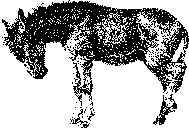Great News! Seal Hunting Take WAY down in 2009!
Global recession and plummeting pelt prices among reasons for decline.
updated 1 hour, 20 minutes ago
ST. JOHN'S, Newfoundland - The global recession, plummeting pelt prices and the prospect of a European ban on seal products dramatically lowered the number of seals killed in this year's hunt, Canadian officials said Thursday.
About 70,000 harp seals were hunted this year out of a commercial quota of 273,000 animals, said Fisheries and Oceans Canada spokesman Scott Cantin. The seven-month long hunt ended earlier this week.
The tally marks a significant drop from last year's hunt, in which 217,857 harp seals were hunted out of a commercial quota of 275,000.
Frank Pinhorn of the Canadian Sealers Association said many hunters decided not to take part this year because pelt prices have fallen to 14 Canadian dollars ($12) from a high of over CA$100 ($88) per pelt several years ago.
"Anything under CA$35 ($31) would be low and they won't participate because they won't recover their costs," he said.
The industry is also carrying about 60,000 pelts from the previous year in a market that is drying up due to the recession, the depressed value of the Russian ruble and growing international distaste for seal products.
Sealers are also grappling with the near certainty that the European Union will ban importing seal products, which could take effect in October.
Animal rights activists, Inuit seal hunters, fur traders and authorities from Canada and Greenland lobbied hard ahead of the vote. Activists call the hunt barbaric, while proponents say it provides crucial jobs and food for villagers in isolated northern communities.
Canada's East Coast seal hunt is the largest in the world, killing an average of 300,000 harp seals annually, before this year's drop.
Europe bans products made from seals
The EU bill targeted the Canadian hunt because of the size of the annual slaughter and the way seals are killed — either clubbed or shot with rifles. In the past, they have also been killed with spiked clubs, or hakapiks.
Pinhorn said he believed the drop is only temporary because people in the industry are hoping to expand the market by using seal products for different purposes, such as seal heart valves for medical procedures or omega-3 products made from seal oil.
"Have we given up on the seal industry? Not a chance," he said. "The seal industry will come back."
WELL I HOPE NOT! -Beth
Subscribe to:
Post Comments (Atom)
Blog Archive
-
▼
2009
(263)
-
▼
June
(25)
- Study: Mainline Clergy OK with Gay Rights, Cautiou...
- My Newest Video
- Peanut butter 'wards off heart disease', say scien...
- For ‘Modern Gals,’ Religion as Off-the-Rack Therapy
- Seal it with a Kiss!
- Herbert William Weekes
- Report: Gay bias killings highest since 1999
- William Luker
- Donkeys were a favorite subject of Edgar Hunt
- Yet another Donkey and Pony by Hunt
- Another Edgar Hunt Donkeys with Pony
- Fox steals more than 100 shoes
- True Love
- I like this post from Huffington Post
- Eminent Danger
- Museum shooting suspect is supremacist
- Loss of experience of community
- Gay activists are wasting all their political capital
- President Barack Obama & First Lady Michelle
- Glowing tartan for common riding
- The Shetland Pony
- The Eriskay Pony
- The Royal Highland Show is a Treat!
- Highland Show to have royal visit
- How words can last a lifetime
-
▼
June
(25)
About Me

- Gimmer
- I grew up in Chautauqua County, NY. I graduated from Edinboro University of Pennyslvania in 1981 with a BFA in Jewelry and Metalworking. I have been married 31 years. I currently run a small business with my husband. We both enjoy the outdoors and animals a great deal and live on a tiny farm in Western, NY.






No comments:
Post a Comment